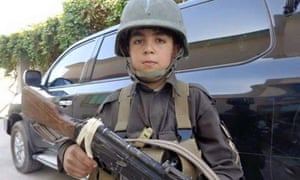Destroying a Child Soldier
"One side made him famous and the other side killed him -- both sides ignored the law and acted illegally."
"Possibly he took up arms to take revenge for his father's death, but it was illegal for the police to declare him a hero and reveal his identity, especially to the insurgents."
Rafiullah Baidar, spokesman, Afghanistan Independent Human Rights Commission
"A program was held at the police headquarters, where his bravery and courage was talked about by officials."
"I was against this move and told the officials that instead of encouraging him to military activities that will ruin his future, let him go to school. He is too young to hand him a gun."
Mohammad Karim Khadimzai, provincial police chief
 |
| Human rights groups have been warning for years that child recruitment has been going on in Afghanistan ... Photo Twitter |
He was all of ten years old. His father ha been killed by the Taliban. And his uncle, once a Taliban commander who converted his allegiance back to the government, then was appointed the local police commander in Khas Uruzgan district, had encouraged his nephew to take up arms. Likely, given the tribal code adhered to in Afghan's provinces, the boy felt that he would avenge his father's death.
"There is a lack of political will to address this issue … there is a specific commitment by the government to clean it up [child military recruitment] but sufficient measures are not being taken."
Charu Lata Hogg, policy and advocacy director, Child Soldiers International
Last year he was feted for his courage as a child taking the role of a man fighting to defend his village from the Taliban. The deputy police chief of Uruzgan province described how young Wasil Ahmad had fought alongside his uncle on several occasions against the Taliban. The police made much of the young boy's exploits as an armed defender of his clan, having him pose for photographs geared in full military uniform with an automatic rifle.
Such an absolute lack of caution and concern for the little boy's welfare is perhaps not surprising in a tribal, war-faring society which has known little else for generations but conflict and given to their values of honour and resolute action on the battlefield, defending their own. But in identifying him and publicizing his exploits and making his photograph publicly available they also set him up for what would next occur.
He was shot point blank twice in the head while doing what many villagers ordinarily do; buying groceries in the capital of the province, Tirin Kot. The Taliban immediately issued a news release that they had taken their revenge on the little boy's impudence in challenging their entitlement to once again administer the political affairs of Afghanistan as they had prior to the U.S.-led invasion over a dozen years ago, before the boy's birth.
Like many other tribal societies such as those in Africa, child soldiers are commonly recruited to take part in battle, trained to carry weapons as tall as they are themselves, heavy burdens for their undeveloped musculature, but appealing to their sense of wanting to be adult, to be respected, to take their place in the defense of all they hold dear; other than those who are impressed to fight, coerced and threatened.
In Afghanistan children are regularly recruited by both the National and the Local Police as fulfilling a sense of duty, demonstrating patriotism, doing the honourable thing. But, emphasized the charity Child Soldiers International, the greatest motivator for those children is poverty and the promise of a wage to help their families pay for the necessities of life.
The charity had found half of the national police check posts "were staffed with visibly younger officers" all of whom identified themselves as being under 18 years of age.
Labels: Afghanistan, Child Abuse, Conflict, Taliban

<< Home